Category: Uncategorized
Court Reporting in Chapel Hill

The Benefits of Utilizing Zoom Hybrid Depositions
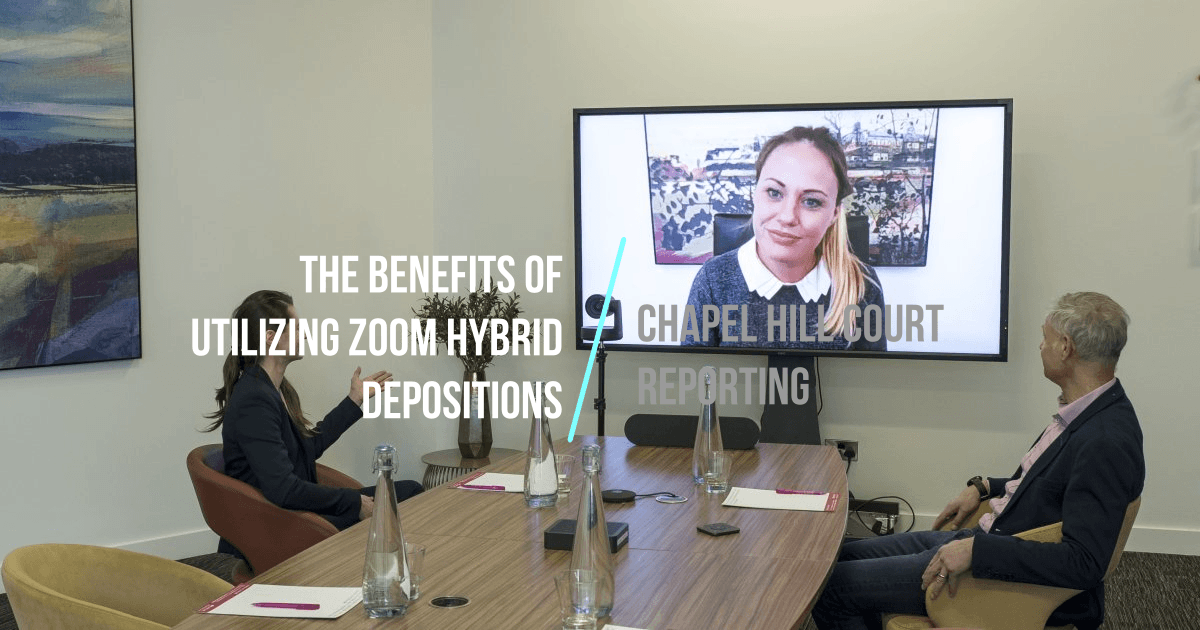
The legal profession has swiftly adapted to the digital era, embracing technological advancements that enhance efficiency, reduce costs, and provide greater flexibility. One such innovation is the integration of Zoom hybrid depositions, which seamlessly blend traditional deposition practices with the power of video conferencing. In this blog post, we delve into the reasons why attorneys are increasingly favoring Zoom hybrid depositions and the benefits they bring in today’s fast-paced legal landscape.
Enhanced Convenience and Efficiency:
Zoom hybrid depositions offer attorneys unparalleled convenience and efficiency. By leveraging video conferencing technology, attorneys can conduct depositions remotely, eliminating the need for extensive travel. This saves valuable time and resources, enabling attorneys to allocate their efforts to other critical aspects of their caseload. Additionally, scheduling becomes more flexible as participants can join the deposition from various locations, accommodating their availability and minimizing scheduling conflicts.
Cost-Effectiveness:
Traditional in-person depositions often incur substantial travel expenses, including accommodation and transportation costs. Zoom hybrid depositions significantly reduce these expenses, making them an attractive option for attorneys. Conducting depositions remotely allows attorneys to utilize their resources more efficiently, ensuring cost-effective legal representation for their clients without compromising the quality of the deposition process.
Expanded Access to Witnesses and Experts:
Zoom hybrid depositions overcome geographical barriers, granting attorneys access to witnesses and experts who may be located far away or in different jurisdictions. This broader reach empowers attorneys to secure crucial testimonies without the logistical challenges associated with travel and coordination. As a result, attorneys can build stronger cases by tapping into a wider pool of knowledgeable and relevant witnesses.
Flexibility in Document Sharing:
Traditional depositions frequently rely on physical copies of documents and exhibits. In contrast, Zoom hybrid depositions enable attorneys to digitize the process, facilitating seamless sharing of electronic documents. With screen-sharing capabilities, attorneys can present exhibits in real-time, ensuring all participants have simultaneous access to the materials. This digital approach promotes efficiency, collaboration, and a streamlined deposition experience.
Improved Focus and Engagement:
Contrary to concerns about virtual interactions leading to distractions, Zoom hybrid depositions can actually enhance focus and engagement. Attorneys retain a central role in the deposition, directing questioning and effectively managing the proceedings. Additionally, the virtual environment can reduce interruptions and disruptions, creating a more fluid and focused deposition experience.
The emergence of Zoom hybrid depositions has revolutionized attorneys’ approach to depositions, offering convenience, cost-effectiveness, and expanded access to witnesses and experts. Embracing this technology allows attorneys to streamline their workflow, improve efficiency, and ultimately provide enhanced legal services to their clients. As the legal profession continues to evolve, Zoom hybrid depositions have emerged as a valuable tool, empowering attorneys to navigate the complexities of modern litigation effectively.
Top iPad Apps for Attorneys: Boosting Productivity and Efficiency
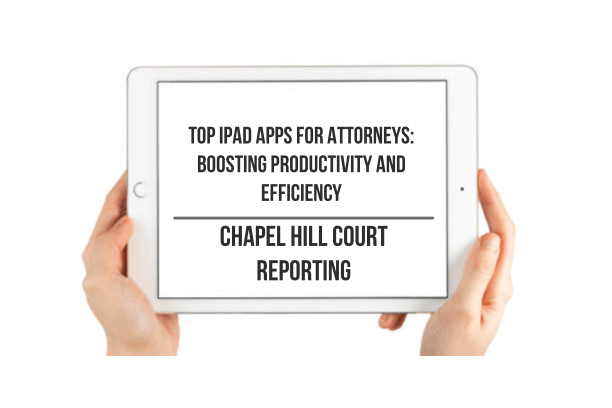
As technology continues to transform the legal profession, iPad apps have become valuable tools for attorneys seeking to enhance their productivity and streamline their workflow. With a wide range of apps available, it can be challenging to identify the most useful ones for legal professionals. In this blog, we will explore some top iPad apps that can significantly benefit attorneys, helping them stay organized, conduct legal research, manage documents, and increase overall efficiency.
Evernote: Organize and Sync Your Legal Notes
Evernote is a versatile note-taking app that allows attorneys to create, organize, and sync their notes across multiple devices. With Evernote, you can take detailed notes during client meetings, depositions, or courtroom proceedings, and tag them for easy retrieval. Its powerful search functionality and ability to attach documents make it an indispensable tool for staying organized and accessing information quickly.
GoodReader: Annotate and Review Legal Documents
GoodReader is an excellent PDF reader and annotator that enables attorneys to review and mark up legal documents on their iPad. With features like highlighting, underlining, and adding comments, attorneys can annotate important sections, collaborate with colleagues, and prepare for hearings or trials. GoodReader also allows for organizing files into folders, making it easy to find and access documents when needed.
TrialPad: Streamline Trial Presentations
TrialPad is specifically designed for trial presentations, making it a must-have app for attorneys involved in courtroom proceedings. This app enables attorneys to present evidence, display exhibits, annotate documents, and create visual aids like timelines and charts. With TrialPad, you can effectively communicate your case to judges and juries, enhancing the impact of your arguments and evidence.
Westlaw: Access Comprehensive Legal Research
Westlaw, a well-known legal research platform, offers an iPad app that provides attorneys with access to a vast library of legal resources. This app allows users to search for case law, statutes, regulations, and secondary sources. Attorneys can conduct keyword searches, save research results, and access essential legal materials on-the-go. Westlaw’s user-friendly interface and powerful search capabilities make it a go-to app for legal research.
Fastcase: Comprehensive Legal Research at Your Fingertips
Fastcase is another reputable legal research app that offers an extensive database of case law, statutes, regulations, and legal documents. Attorneys can leverage its advanced search and filtering options to find relevant legal materials quickly. Fastcase’s intuitive interface and offline access feature make it a valuable tool for conducting legal research from anywhere, even without an internet connection.
iAnnotate: Annotate and Manage PDF Documents
iAnnotate is a feature-rich PDF annotation app that allows attorneys to read, highlight, underline, and add notes to PDF documents. It also supports document signing, form-filling, and the creation of custom stamps, streamlining document management tasks. With iAnnotate, attorneys can efficiently review contracts, pleadings, and other legal documents, enhancing collaboration and saving time.
Microsoft Office Suite: Create, Edit, and Review Legal Documents
The Microsoft Office Suite, including apps like Word, Excel, and PowerPoint, offers attorneys familiar and powerful tools for creating, editing, and reviewing legal documents, spreadsheets, and presentations. These apps seamlessly integrate with other Microsoft Office products and cloud storage services, allowing for efficient collaboration and document management.
Clio: Practice Management and Client Collaboration
Clio is a widely-used practice management app that helps attorneys streamline their workflow, manage client information, track billable hours, and handle document management tasks. With Clio, attorneys can stay organized, automate administrative processes, and improve client collaboration, ultimately enhancing their overall productivity
To book your next deposition, Please call our office at 919-682-7757 or Click Here!
Working from Home: Helpful Tips and Tools When Attending a Remote Deposition
Working from home has become extremely popular over the last few years. For some, they wouldn’t have it any other way. The number of people who work from home has increased by 159% since 2005, according to a recent report from Global Workplace Analytics.
By now, we should all be used to the “new norm” of working from home. Even though it can have some big advantages, it can also present some challenges when it comes to a remote deposition.
What Is a Remote Deposition?
A remote deposition is a legal proceeding that allows attorneys and witnesses to attend remotely rather than in person. This is, usually, done via videoconferencing. It allows attorneys to question witnesses located elsewhere. This technology can be a huge advantage for plaintiffs because it allows them to take testimony from witnesses who might not be available to attend otherwise. Without the proper tools it could be difficult to hear the testimony clearly.
Here are some tips and tools to help you make the most of your remote deposition experience:
Tips to Ensure Your Remote Deposition Goes Smoothly
● Make sure you have a strong internet connection and your camera and microphone work correctly. We recommend testing the platform you will be using in advance, so you are familiar with it.
● Have your documents prepared and organized. Doing this will ensure you can easily find them when needed during the deposition. This is a tremendous time saver.
● Make sure you are set up in a quiet place with no distractions. This will help in blocking out background noises and aid you in being able to focus on what is being said during the deposition. Muting yourself while not speaking is a good rule to follow as well.
● It is important to pay attention and take notes during the proceedings. This helps you remember what was said and can be extremely helpful when you are reviewing the transcript.
● Ask for clarification if you need it. It is important that you hear everything clearly. It is better to get clarification during the deposition than it is to wait until you are reviewing the transcript.
● There might be a delay in audio transmission due to internet lag time. Because of this, it is important to speak slightly slower and clearer than usual so everyone can understand you clearly.
In Summary
Remote depositions can be challenging and getting everyone on the same page with the technology can sometimes be difficult. Some people may feel more comfortable in person, which could cause them to be less likely to open up or engage during the process.
Chapel Hill Court Reporting Services can help you through these challenges. We provide experienced court reporters, legal videographers and interpreters who are familiar with the latest technology and software programs. We work with you to make sure your remote deposition operates smoothly and efficiently.
Chapel Hill Court Reporting Services has been covering Chapel Hill and Durham, North Carolina, for the last 30 years with experienced court reporters and legal videographers. Our conference rooms are free of charge!
Contact us today if you would like to learn more about the services we offer.
What Clear Communication During Your Deposition Can Do For You

There’s no question that attending a deposition can be stressful for every party involved. The truth is that being interviewed or interrogated isn’t easy, but if you practice clear communication and learn the necessary skills, you will feel more confident and this will help speed up your deposition.
Practice
The point of any deposition is to gain facts and clarify information. One of the best things you can do before your next deposition is take the time to look over all of the important information and facts so you are not blindsided by a difficult or touchy question you may be asked. This also eliminates the time needed for someone to ask you to clarify or ask you “What do you mean by that?”
Answer In Complete Sentences
During your deposition, it might feel natural to answer a question with a head nod or a head shake, but refrain from doing this! The court reporter needs clear yes or no answers so he/she can provide you with the most accurate transcript. By avoiding this, you also eliminate the time needed for the other party to ask you to answer with yes or no.
Take Turns
We understand it can be difficult to stay on top of yourself during a deposition; however, it is really important to completely wait until one party is done speaking before you start speaking. This will save you time by eliminating the need for the court reporter to chime in and get things back on track.
Schedule your next deposition here
!
What is Your Court Reporter Doing During that Deposition Break?
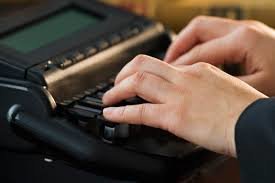
Sitting in a courtroom or deposition suite all day, while capturing every word spoken by attorneys, witnesses, and judges, is a physically demanding activity. Court reporters, perhaps surprisingly, have a high percentage of repetitive stress injuries like carpal tunnel syndrome, thoracic outlet syndrome, and degenerative neck and back injuries.
In order to stay physically comfortable and prevent injury to their most valuable piece of equipment – their bodies – court reporters must make special efforts to regularly stretch and get their exercise in. One long-time court reporter, Donna Linton, recently shared some of her tips and tricks with the Washington Post.
“Court reporting is very intense and I love it, but if you’re sitting there typing all day, your shoulders and your neck get tight. It’s stressful sitting there like that for a long period of time. As soon as we get a break, I’m running to the bathroom and looking at my phone to check my email. Then I’m also popping a piece of chocolate in my mouth. I’m doing shoulder rolls, and I might be doing pushups on the wall in the bathroom. I do squats in the bathroom.
“If my wrists start bothering me, which is very rare, I have some gloves with a thick wristband I bought years ago. [Therapeutic support gloves from Handeze.] I wear them for a couple hours, then I’m fine. I heard about them from someone who did knitting and crocheting. I don’t know how it works, but it works.”
Court reporters’ “office days” – days they’re in the office preparing transcripts – are just as physically demanding. Linton has a little more flexibility about when she can stretch on those days:
“When I’m working at home, I try to get up every hour to do stretches. I have bad arthritis in both my hips. I had hip surgery, and my other hip will have to be done. I do specific stretches with bands and I work my glutes. I do hip flexor stretches, but I’m an allover body workout person.”
By consciously making exercise and stretching a part of their daily routine, court reporters can extend their careers and more comfortably endure long days in a deposition suite. The next time you’re in a deposition, be sure to give the court reporter enough time during the break to get those stretches in – and who knows, maybe if all of the deposition participants exercised for a minute or two during breaks everyone would benefit.
We would love to cover your next deposition in the Chapel Hill area, and we promise we won’t force anyone to stretch or do squats. Schedule using our handy online tool or call 919-682-7757.
The Olympics of Court Reporting
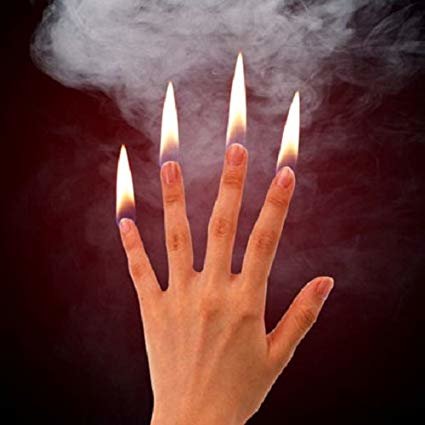
If you’ve ever watched a court reporter at work in a deposition suite or a courtroom, you’ve probably watched in awe as their fingers fly and amazed that they can take down every word – correctly – as it’s spoken.
Any court reporter will admit that keeping up with fast talkers can be challenging. In conversational speech, people generally speak at a rate of 125 to 150 words per minute. When someone is reading from a report or other paperwork they usually speak at a slightly higher rate, and if they’re reciting a code or saying they have memorized they speak faster still. These higher rates can fluster even the best court reporters.
Some court reporters thrive on speed, though, and a number of them recently competed in “the Olympics of court reporting” at the National Court Reporters Association convention in Denver. Twenty-nine men and women, representing court reporters nationwide, competed at the National Speed Competition, where dictation speeds reached 280 words per minute.
According to the Denver Post, there was some serious preparation going on within the walls of the Colorado Convention Center.
“A man poured baby powder on his hands to soak up the nervous sweat, a computer fan blowing a slight breeze on his face. Across the aisle, in a silent hotel conference room, a contestant rubbed her face, breathing deeply.
Then, an explosion of movement — well, from the wrist down. A room full of the nation’s fastest court reporters flew into action, their fingers dancing rhythmically across an array of black keys as a machine-like voice read a story about the psychology of sociopathic cats. The goal: capturing each of the 220 words uttered every minute — without making mistakes.
Donna Urlaub flew in from Chicago to take a crack at the titles. It’s her 50th year of court reporting and 32nd year competing, so she knows the drill.
Urlaub prepared every night for the competition by watching and transcribing ABC’s “World News Tonight” program. She likes the “How It’s Made” show because it presents unusual words that keep her on her toes — er, fingers.
She can type “diaper” with just one key stroke — a product of doing lots of freelance medical testimony.
“But I don’t have a brief for ‘psychopath,’ ” she lamented.
The name of the court reporting game, Urlaub said, is practice. Constant practice.
In the speed contest Wednesday, contestants raced to complete three, five-minute sessions, escalating in speed and difficulty. Afterward, they’re allowed to clean up their transcriptions, and the person with the most accurate account takes home the gold.
And it’s all done in complete silence.
“There’s a real element of surprise,” Urlaub said, explaining how the phrase “people’s exhibit” tripped her up. “You never know what to prepare for.”
Court reporter Jeffrey Wiegel, RMR, CRR, CRC, won the competition. His overall accuracy rate on the 280-wpm dictation was 97.54 percent.
Scheduling an Out-of-State Court Reporter

When you need to conduct a deposition outside of your local area, how do you schedule a court reporter? Maybe you’ve scheduled many out-of-town depositions in your career, but maybe you haven’t. Whether you’re an attorney, paralegal, or legal assistant, let’s discuss some of the options you have.
The first and best call you can make is to your local court reporting firm. If your regular court reporting firm doesn’t cover the area to which you’ll be traveling, they will likely be able to refer you to a trusted firm in the area. Here are a few reasons why you’ll want to call your local court reporting firm first when scheduling an out-of-state deposition:
• Quality – You get a quality court reporter no matter where you are going in the country.
• Convenience – If your court reporting firm regularly sets up out-of-state depositions, they’ll have a database of court reporters and videographers they know and trust. Plus, whenever you have a question about a deposition transcript or need a replacement copy, you’ll only have one number to call.
• Predictability – Your regular court reporting firm can communicate your standard order and standard order format to the out-of-state firm, so you can rest easy knowing you’ll get exactly what you need.
In addition, you should consider whether you need to travel to take the deposition. Because of advances in technology, depositions are being taken by videoconference more frequently than ever. Legal Media Experts has been on the cutting edge of implementing deposition videoconference technology. The platforms we utilizeare secure, offer HD video and audio, real-time streaming text, easy document sharing for exhibits and more.
If you’re in need of a court reporter in North Carolina and your local firm doesn’t cover the area or if they’re unable to provide you with a referral, you can depend on Chapel Hill Court Reporting Services to provide experienced, certified court reporters and videographers. We are based out of Chapel Hill but cover Raleigh, Durham, Greensboro, and Fayetteville. Book your next out-of-state deposition with confidence, book with Chapel Hill Court Reporting Services!
Ten Things Court Reporters Want you to Know
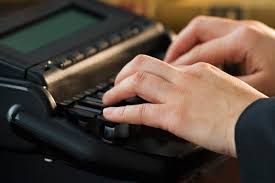
When your court reporter arrives at your deposition, their
goal is to take down an accurate, verbatim record of the proceedings and
provide you with a timely transcript. There are some easy things you can do to help
your court reporter serve you.
1. Who are you? How
do you spell that name?
Either before you arrive at the deposition, or prior to the
deposition’s start, give your court reporter the full case caption, including
counsel for all parties. If there is a Notice of Deposition containing all of
that information (including contact information for all counsel), that is the
easiest way to communicate that information. Also, if you give your court
reporter the spellings of the proper names and technical terminology in the
case, they’ll be able to add those to their dictionary ahead of time. This is
especially helpful if you’ll be using a realtime court reporter.
2. Pause to mark
exhibits
Court reporters can’t mark exhibits and take down the record
at the same time. If you quickly hand the exhibit to the court reporter then
ask your question without skipping a beat, either the exhibit won’t get marked
right away or the reporter will miss part of your question. By pausing for a
few moments while the exhibit is marked, you can ensure that you’ll have an
accurate and complete record.
3. Communicate
expectations early and clearly
All depositions are different, which is why it’s important
to communicate specific needs that you may have before it begins. If you need a
realtime feed, be sure to request “realtime” on the online scheduling
form or when you are scheduling on the phone.Realtime reporters require special
certification, and not every court reporter is certified to provide realtime.Likewise,
if you need an interpreter, a rough draft, or otherwise expedited service, be
sure to communicate that at the time of booking, and, if expedited, give a
specific date and time that the transcript will be needed.
4. 7th Inning (or 3rd
Inning) Stretch
Taking quick breaks throughout an all-day depositions is a
good practice both for you AND your court reporter! In addition to allowing
everyone to rest and stretch, they’ll help you and your witness to refocus,
which could shorten the total deposition time. It also helps your court
reporter prevent repetitive stress injuries and prolongs their career.
5. Not too fast, not
too quiet
Be aware of how fast you’re speaking or if the witness is
mumbling or soft-spoken. Court reporters don’t like to interrupt your
deposition to ask for someone to slow down, speak up, or enunciate, so if you
pay close attention to these potential problems you can avoid interruptions.
Before the deposition, encourage your witnesses to speak loudly and clearly,
and to not cover their mouth with their hands.
6. Defuse arguments
Sometimes, depending on the nature of the litigation or the
relationship between the attorneys or parties, there is a potential for heated
arguments during a deposition. However, your interest should be in preserving a
good record. No matter how high emotions (or stress) are running, try to not
talk over anyone or allow shouting matches to break out during the deposition.
If necessary, take a short recess so the parties can compose themselves.
7. We’re neutral –
like Switzerland
Court reporters are neutral third parties, officials of the
court, and are not supposed to give, or even have, an opinion of how we think
your case is going. In reality, we only ever hear one side of the evidence, so
we wouldn’t make good judges anyway!
8. If we can hear it, it’s
going in the record
Beware: Everything that can be heard on the video will be transcribed.
Everything! So if you don’t want something to be on the record, either write it on
a piece of paper and hand it to your co-counsel or client, or say, “Off
the record.”
9. Finish your sentences.
Even if your point has been made in courtroom or in the
deposition, it may not be on the record. If you begin a question with “As if he
were…” or “Over the…” and leave the question hanging without finishing your
sentence, whoever is reading the transcript will be left to draw their own
conclusion as to what you meant.
10. “Let the record show.”
Everyone has mannerisms and speech patterns that they cannot
control. Some people talk with their hands, others nod, others say “yup” or
“uh-huh.” When attorneys speak like this in the courtroom or in
depositions, they often forget about these peculiarities, which can result in
an awkward situation for a court reporter. For instance, if an attorney asks
his client about a number on a piece of paper, and the client responds, “This,”
the record isn’t going to be very clear. An attorney should make every effort
to make sure all testimony is spoken. If it is not, a simple “let the record
show” can be used to clarify nods, gestures, and other unspoken responses.
Frustrated by a Court Reporter’s Interruptions? Here’s How You Can Prevent Them.

Believe it or not, your court reporter wants to interrupt a
deposition about as much as you want them to; that is, they’d rather not
interrupt at all. Court reporters are the guardians of the record, however, a
responsibility they take seriously. They are concentrating on every single word
uttered by each participant in your deposition or hearing and will interrupt
immediately if they aren’t able to capture what is being said.
Clearly, when the court reporter speaks up, it disrupts the
flow of your questioning and could cause you to forget where you were headed.
The court reporter doesn’t mean any harm by interrupting; they’re just doing their
job.
The most common reasons a court reporter will interrupt a
deposition are:
- ·
Speed – All court reporters can take down fast
talkers, but there’s a limit. - ·
Mumbling – This usually goes along with speed,
but not always. Instances of mumbling increase when witnesses or attorneys are
reading along with a document or going through standard deposition
instructions. If the witness is naturally mush-mouthed, you’ll need to instruct
them to enunciate. - ·
Volume – If the court reporter can’t hear it, it
can’t get into the record. Attorneys usually don’t have a problem making
themselves heard, but a soft-spoken witness might need to be reminded to speak
up. - ·
Multiple people talking at the same time – When
multiple people are talking at the same time, the court reporter can only take
down what one speaker is saying. You won’t have full control over making sure
deposition participants don’t talk over each other, but if you do your part by
letting the other person finish speaking before you speak, that will go a long
way.
At your next deposition, keep these tips in mind and you’ll
experience few, if any, interruptions.
Schedule your next deposition online with Chapel Hill Court Reporting Services at Schedule Online Now